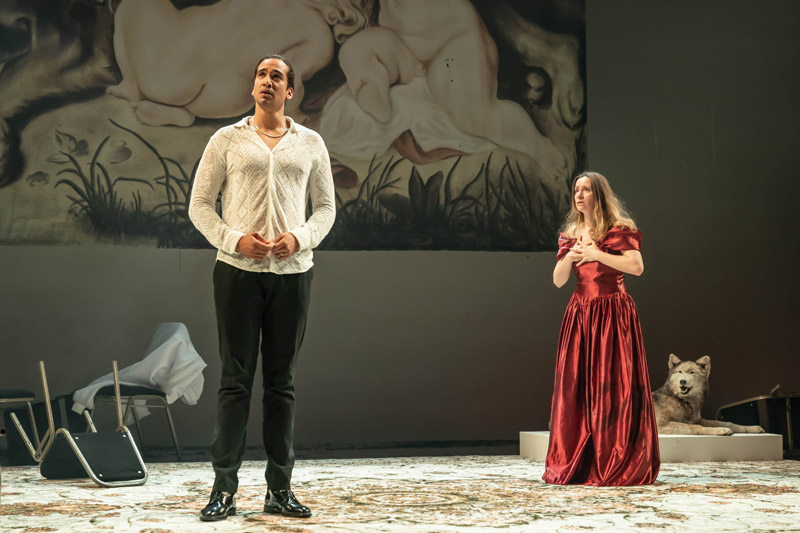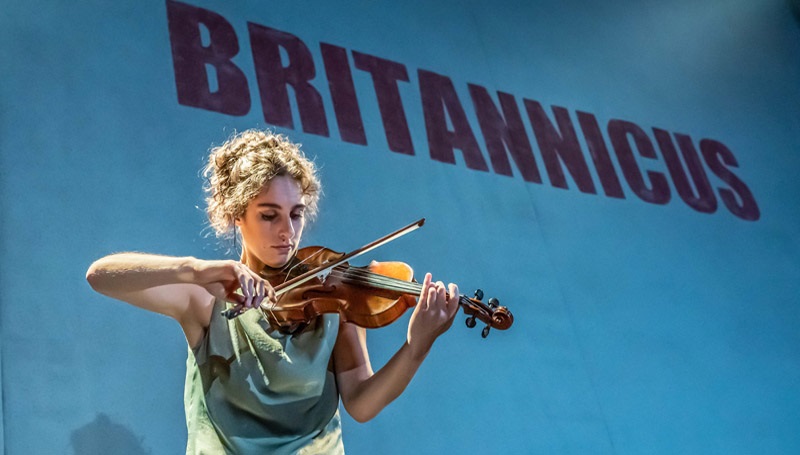“Britannicus” – Lyric Hammersmith
Neil Dowden in west London
8 June 2022
Jean Racine’s tightly structured neoclassical plays – obeying the unities of place, time, and action – written with declamatory elegance in the French alexandrine metre are not easy to put across effectively to a contemporary English-speaking audience. Timberlake Wertenbaker’s concise 2011 translation of Racine’s 1669 ancient Roman tragedy Britannicus does a pretty good job with the language. But despite enterprising direction from Atri Banerjee and some strong performances, the passions that burn at the heart of this psychological drama cum political thriller do not fully come alive in this modern-dress production at Lyric Hammersmith.

Sirine Saba.
Photo credit: Marc Brenner.
Britannicus is one of those plays – Shakespeare’s Julius Caesar is another – where the title character is not actually the most important role. Racine’s main interest is in the mother/son relationship between Agrippina and Nero. After the death of Emperor Claudius, his widow Agrippina uses her privileged position to engineer her son Nero (from a previous marriage) to power despite his stepbrother and Claudius’s older son Britannicus having the prior claim. But although the domineering Agrippina is determined to keep control of Nero and through him the Empire, not only does he kidnap his rival Britannicus’s fiancée Junia he also plots to assassinate him, as Nero turns towards the psychopathic megalomania for which he later became infamous.

Nathaniel Curtis and Shyvonne Ahmmad.
Photo credit: Marc Brenner.
Britannicus shows us a man emotionally warped by oppressive parenting, who longs to become independent and then starts to take pleasure in controlling and hurting other people. But it also reveals the dangers of political corruption and of the way tyrants can abuse power. Characteristically, Racine sets up a number of duologues in which characters confront each other or one confides their inner feelings to another. It’s a concentrated format that requires a disciplined intensity to make it work dramatically that is not always achieved here.
Banerjee (winner of The Stage Debut Award for Best Director in 2019) has his cast sit on chairs at the side of the stage when they are not participating in scenes, so the focus is maintained in this 100-minute interval-less show. Between scenes the cast sometimes briefly convulse as if electrified by the playing of a violin. There are some effective touches such as ashes dropped down from above after a murder and chairs being kicked over as things get violent, but the innovative staging is stylish rather than engaging.

Sirine Saba, Nathaniel Curtis and Nigel Barrett.
Photo credit: Marc Brenner.
Rosanna Vize’s stripped-back design suggests a corporate office setting, including a watercooler and a stuffed wolf (which like the cropped Rubens painting of Romulus and Remus hanging on the wall) suggests the savage myth of the founding of Rome involving fratricide. Lee Curran’s startling coloured lighting changes add to the heightened atmosphere.
The quasi-incestuous relations between mother and son are powerfully conveyed by Sirine Saba’s prowling, black-clad, dominatrix-like Agrippina and William Robinson’s brilliant performance as scarily funny man-child Nero whose mood shifts unpredictably from weeping self-pity to ruthless sadism. Nathaniel Curtis (who starred in Channel 4’s It’s a Sin) presents Britannicus with rather insipid naivety, while Shyvonne Ahmmad has the somewhat thankless role of the hapless Junia. Hanna Khogali plays not only Agrippina’s confidante but also a violin – which ends up in Nero’s hands, looking forward to the time when he fiddles while Rome burns.









